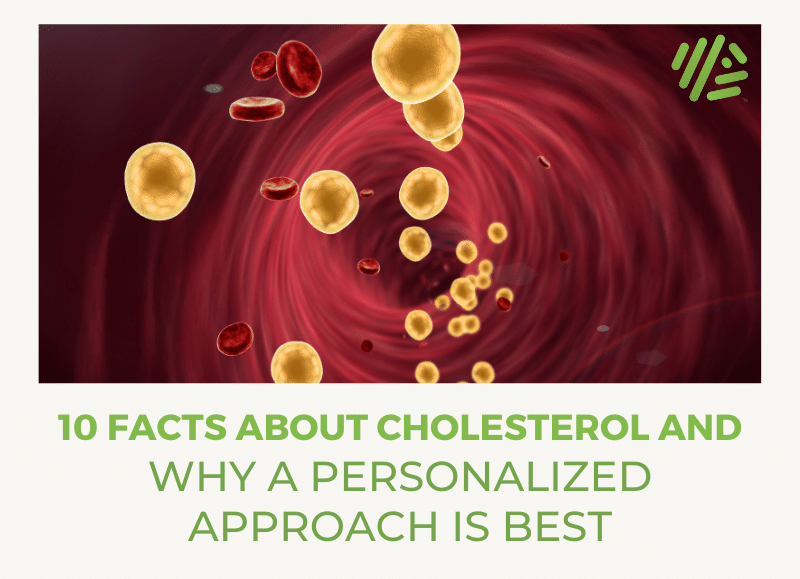Is Cholesterol Heart Healthy? It Depends on Your Genes
Article at a Glance
- Most people absorb very little of the cholesterol they eat, and when absorption goes up, the amount of cholesterol produced in the liver goes down. As such, the body tends to highly regulate cholesterol levels.
- However, in some people with genetic predispositions, saturated fat and high fat diets significantly increase levels of LDL-C, which has been associated with greater risk of heart disease.
Genes Mentioned

Contents
Cholesterol.
Who would have thought this one organic molecule could inspire so much controversy? Well, if you follow the diet wars, you certainly believe it. In fact dietary cholesterol is one of the nutrition topics that inspires the fiercest debates, with health experts like Dr. Mark Hyman and Dean Ornish completely disagreeing on what is the best approach.
Despite what it may do to some people’s lipids, cholesterol is essential for life, forming about 30% of all our cell membranes and providing flexibility in our cells. Additionally, cholesterol is the key component of many hormones including estrogen and testosterone, and is also required for the synthesis of vitamin D. 1 2
Cholesterol also forms bile acids which facilitate the digestion of fats and oils in the intestine as well as aiding the absorption of the fat-soluble vitamins A, D and E.
Most of the cholesterol in the body is made by the body
Because cholesterol is essential to life, our bodies make the majority of cholesterol in the body.
The liver makes cholesterol, as do red blood cells. Cholesterol made by the body is called “endogenous” cholesterol, whereas the 20% or so we get from cholesterol in the diet is called “exogenous” cholesterol.
Historically, eating high levels of cholesterol in foods like eggs, was thought to increase blood cholesterol levels, and so, the idea that a high cholesterol diet is bad was born. 3
However, numerous studies have since pointed out several flaws with this hypothesis. 4
First, while a high level of total cholesterol is associated with an increased risk of heart disease, many who suffer from heart disease have normal blood cholesterol levels. 5
Second, excess dietary cholesterol is excreted in stool, and any dietary cholesterol which is absorbed results in a decrease in cholesterol synthesis in the liver. 6 7
Together this means that even a diet very high in cholesterol has little, if any, impact on the cholesterol levels in the blood which are maintained at a steady state in most people.
Not everyone has the same reaction to dietary cholesterol
However, not everyone fits neatly under this umbrella.
In fact, there is tremendous variability in cholesterol absorption, with some of us absorbing only 20% of the cholesterol we eat, while others absorb as much as 85%! We now know that genetic variants in genes like ABCG5 and ABCG8 determine how much cholesterol an individual will absorb. Research by world renowned lipid expert Dr. Tom Dayspring also indicates that APOE4 carriers are far more likely to be hyper-absorbers.
In people who hyper-absorb cholesterol, eating high cholesterol foods like eggs will have an impact on their LDL levels, and as a result, their risk for heart disease over time.
Anyone interested in this topic should read the excellent 2020 paper from the European Heart Journal titled: Genetic variability in the absorption of dietary sterols affects the risk of coronary artery disease.
So much of the cholesterol discussions you find online and via Google search are outdated and based on either old science, or partisan science.
For many people, eating eggs will have no impact on blood lipid markers, while others will be at increased risk. In a previous podcast, we covered the American Journal of Clinical Nutrition study on egg consumption and the impact on biomarkers like LDL-C. The ACJN study, which found minimal impact on cholesterol levels even when subjects ate 7 eggs per week, is well worth a read.
Dietary cholesterol interacts with the microbiome
We close on cholesterol and the microbiome. It’s not just about how we make and absorb cholesterol, another important factor is what the microbiome does with the cholesterol we eat.
The New England Journal of Medicine has published some excellent studies on how eating eggs and dietary cholesterol changes the microbiome, specifically causing the production of a compound known as TMAO, which is linked to heart disease.
For example, in one trial, the NEJM researchers fed subjects eggs and measured TMAO levels, which went up. When the same subject were placed on antibiotics and then fed eggs, TMAO levels didn’t rise, suggesting that it is the composition of the microbiome which leads to TMAO production and the increased cardiovascular risk that comes with it.
In closing
In closing, while it’s true that dietary cholesterol has been improperly demonized, there are exceptions to every rule.
In order to determine what the best approach is for your health, learn how much cholesterol you absorb, how your body responds to saturated fats, and last, the state of your microbiome.
As Carl Jung famously said, “the more a law lays claim to universal validity, the less it does justice to the individual facts.”
Good luck.




Have you ever done a comparable post on the dangers of sugars and simple carbohydrates and how they are more concerning than fats and cholesterol?
Great article. I’m retired from a career in science and I always appreciate, and trust, carefully documented articles.
Joe, thank you for the comment. I will put together a companion piece on sugar, good idea.
Thanks John , after months of reading and listening to both sides of the arguments , I believe you have completely nailed it in this short summary. As a Apoe 3/4 I follow your mediterranean diet and keep saturated fats , sugar and alcohol to an absolute minimum. I’m not afraid of some sweet potatoe and oats as carbs , and my markers are great. I did however refuse to take a statin on the advice of my cardiologist as my LDL-C was low but I had a calcium score of 17 and he felt a statin would stabilise plaque progression. It’s very hard for the lay person to get a clear understanding and very easy to get bad advice from the experts ! Thanks for a great summary of the facts as of today.
David, thanks for your comment and thank you for reading. As you know firsthand, it is really difficult to find any nuance on issues like these, so a post like this is our attempt to try as best we can to introduce a synthesis of both sides of the fence. Glad you found some value in what we are doing, and best of luck on your journey.